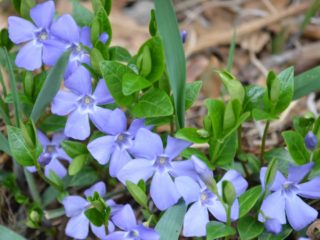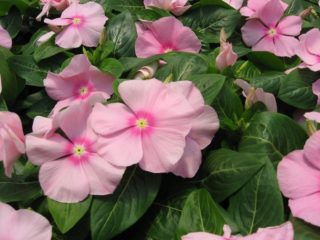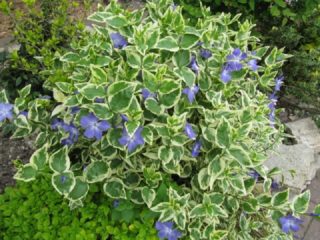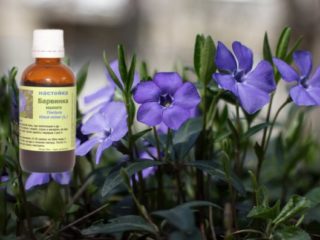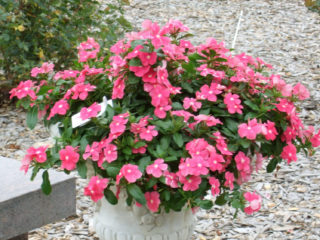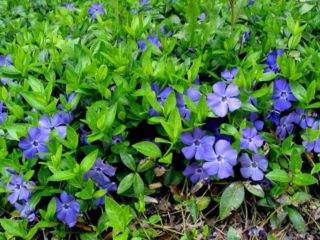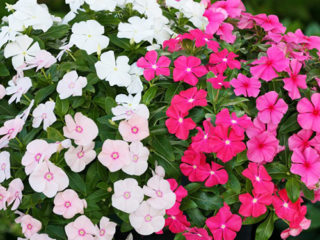Content
A photo and description of the small periwinkle can be found with equal success both in the gardener's reference book and in the medical encyclopedia. This medicinal plant has been successfully used in folk medicine for several centuries, and even traditional science has recognized the positive results of its use.
Description
Small periwinkle (Vinca minor) belongs to the Kutov family. This herb can be found today in almost every corner of the planet, although it prefers temperate climatic zones. However, the high adaptability of the lesser periwinkle allows it to be successfully cultivated both in the southern and northern regions.
This variety is classified as a perennial shrub type. Lesser periwinkle has a spreading crown and two types of shoots (primary and secondary). The main stems are flowering. Both are covered with thin greenish-red bark. The leaf plates (3-5 cm) are elliptical and have a leathery structure. The outer side of the leaf is bright green, the lower part is greenish gray.
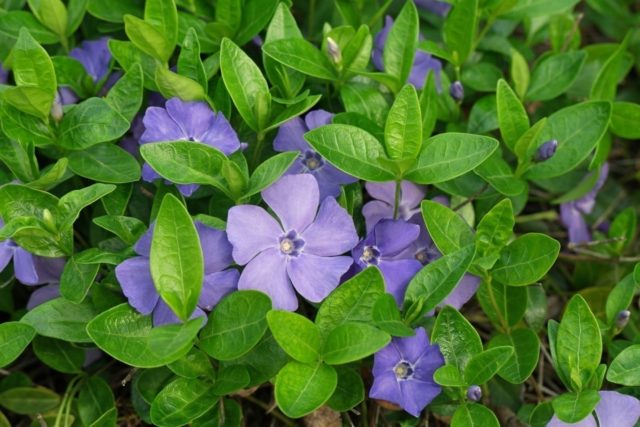
Periwinkle is most often used as a ground cover crop
The root system of the plant is powerful. It is located in the upper layers of the soil and can grow to an area of 0.7-0.9 m². The height of the lesser periwinkle varies from 20 to 40 cm and depends on the habitat. The variety blooms from late April to August (depending on the species) with small azure-colored flowers not exceeding 2.5-3 cm in diameter. At the end of the flowering period, the small periwinkle forms an oblong fruit filled with seeds.
Chemical composition
The microscopy of the lesser periwinkle made it possible not only to get acquainted in more detail with the structure of the plant, but also to analyze its chemical composition.
Studies have shown that it contains more than 50 alkaloids - organic compounds that are actively used in medicine. Among them are vinblastine and lerosine, which are used in folk medicine as antineoplastic agents.
Also, the small periwinkle includes:
- ursolic acid;
- carotene;
- tannins;
- flavonoids;
- vitamin P;
- calcium;
- zinc;
- iron;
- potassium.
Pharmacological properties
Lesser periwinkle (Vinca minor) has a sedative, vasodilating and antimicrobial effect. Drugs based on it can stop bleeding, lower blood pressure and have a calming effect.
The alkaloids devinkan and vincamine, which are part of the periwinkle, have a positive effect on cerebral circulation. On the basis of the plant, preparations are made for neurogenic tachycardia and lymphogranulomatosis.
Varieties
Despite the fact that there are only 12 varieties of periwinkle in the wild, breeders have managed to breed many ornamental varieties of this culture. Modern gardens delight the eye with periwinkle flowers of various shades: from white to purple.
Atropurpurea
Small periwinkle "Atropurpurea" is distinguished by the presence of purple colors and two blooms: in May-June and in August-September. A plant with a height of no more than 30 cm can occupy an area of up to 1 m². Ovoid leaves differ from wild species in length.Their size reaches 4-4.5 cm.
A young bush of small periwinkle has low frost resistance, therefore, it requires an obligatory shelter for the winter. The optimal site for planting a variety is a place with little partial shade. Planting in the open sun is fraught with frequent watering.
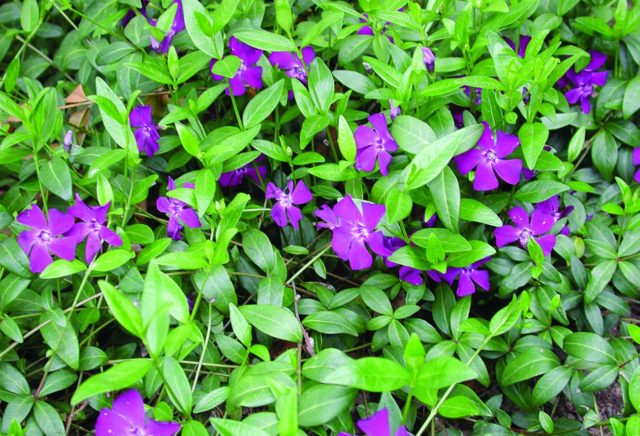
The culture looks organic both on lawns and in hanging containers
Aureovariegata
Small periwinkle "Aureovariyegata" is a surprisingly beautiful decorative species with delicate lilac flowers no more than 2.5 cm in diameter. Another difference from the classic varieties is the leaves. In this variety, they are soft and light green with a yellowish edging around the edge.
The Aureovariyegata variety is distinguished by its high resistance to low temperatures. He requires shelter only in the absence of snow, and then only in order to maintain a bright shade of green mass.
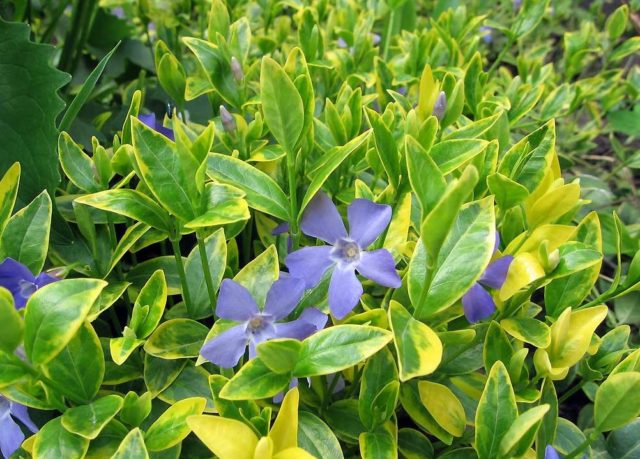
The variety "Aureovariyegata" thrives both in the shade and in the open sun
Alba
Small periwinkle "Alba" is a creeping shrub with milky-white small inflorescences and elongated leaves (up to 5 cm). Abundant flowering of the variety can be observed in May-June. The rest of the time it takes the form of a "green carpet".
Despite the fact that the variety can grow in the sun, it shows more lush flowering in darkened areas. Designers use this plant most often as a ground cover crop.
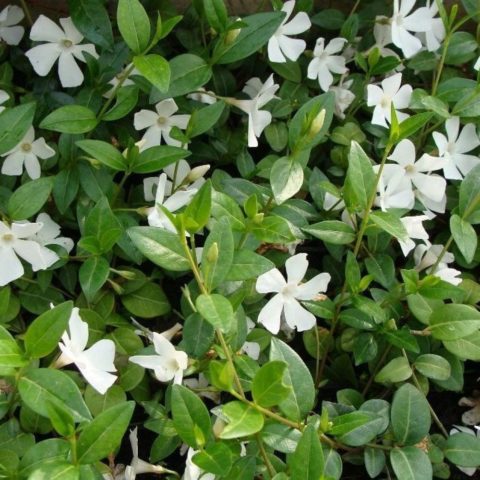
Periwinkle "Alba" is often planted in rockeries
Illumination
Small periwinkle "Illumination" is one of the few golden-variegated varieties of periwinkle. It is a ground cover type shrub with lavender flowers and golden foliage with green edging. The variety is distinguished by its unpretentiousness. It can grow even in very dark areas, so it is often used as a decorative carpet for fences and in the tree trunk circle.
The Illumination variety tolerates drought well, as it is able to draw moisture from any type of soil. This species is often planted next to dwarf conifers.
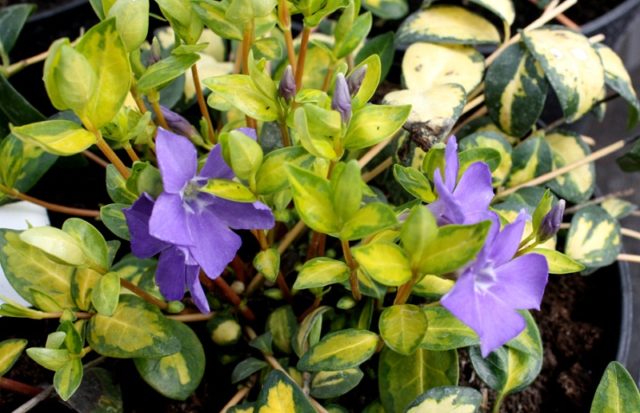
Illumination is often used as a protection against erosion and weed growth.
Captivity (Plena)
One of the most beautiful varieties of small periwinkle - "Plena". Its main advantage is spectacular double flowers of a violet-blue palette, reaching 3 cm in diameter. The "Plena" variety blooms actively in April-May, passively - from June to September.
Like most other species of small periwinkle, this variety is distinguished by frost resistance (up to -30 ° C) and unpretentiousness. However, the culture does not like highly shaded areas, preferring the sun or partial shade.
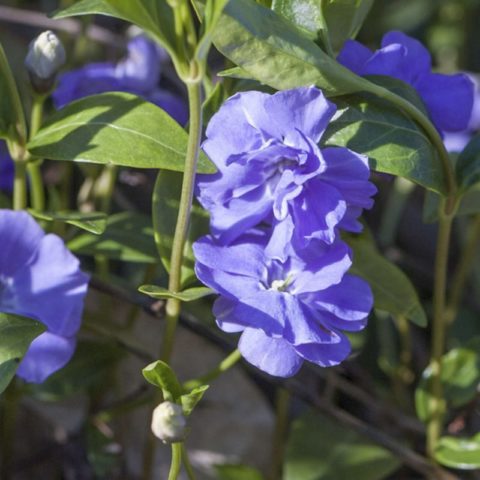
Periwinkle "Captivity" looks great in hanging compositions
Blue End Gold
"Blue and Gold" (Blue and Gold) is distinguished by an unusually variegated color of the leaves, which, in combination with shades of flowers, allows you to create a beautiful grassy cover on the site.
The variety is unpretentious, like all other species, however, for better flowering it requires a little more light or at least diffused lighting. It tolerates frost firmly, does not require shelter, and is excellent for the central regions and the middle zone.
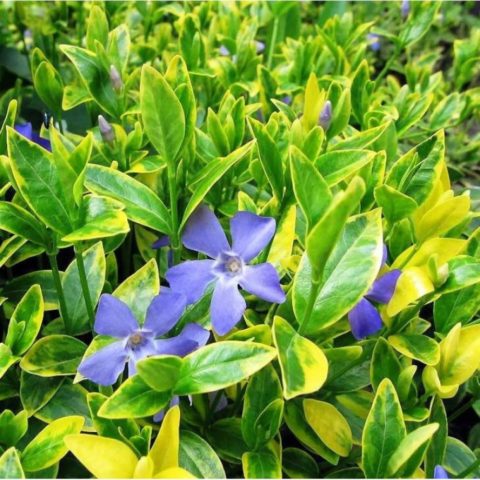
The Blue End Gold variety is an excellent ground cover, often used in landscape design
Healing properties
Small periwinkle has a whole range of medicinal properties. It is actively used for migraines, dizziness and sudden surges in blood pressure. The alkaloid devinkan has a hypotensive effect by lowering the vascular tone, therefore, preparations based on vinca extract are used in the treatment of cerebral vessels.
Extracts and decoctions from a plant of this variety are recommended for toothache, lotions from it are often used for skin diseases. The substances contained in periwinkle stimulate regeneration and have a strong anti-inflammatory effect.
Application in medicine
The pharmacognosy of small periwinkle is more than one hundred years old. It has been actively used since the days of ancient medical practice. Doctors often prescribed it to their patients for fever, malaria and skin diseases (rash, eczema, itching).The trace elements present in the composition of periwinkle promote blood clotting, therefore decoctions, infusions and lotions from this plant are recommended for various types of bleeding (uterine, nasal, pulmonary).
An alkaloid called "rosevin" is used in medicine in the treatment of tumor diseases (lymphogranulomatosis, hematosarcoma, multiple myeloma). Vincapan, like devinkan (alkaloids), has a vasodilating and mild sedative effect. The extract from periwinkle Atropurpurea improves the condition of the capillaries, has a positive effect on diseases such as impotence and weakness.
Folk recipes
In the common people, the periwinkle is called a burial ground, brilliant green and hornbeam grass. From it, infusions and decoctions are prepared, which are actively used in the framework of traditional medicine.
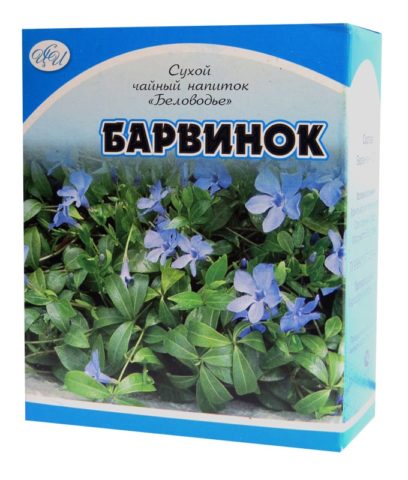
Dried periwinkle can be purchased at any pharmacy
Infusion
Infusions from this herb are indispensable for high blood pressure, as well as intestinal bleeding and tuberculosis.
In order to prepare the herbal infusion, it is necessary to pour 200 ml of boiling water over 4 g of dry small leaves, and heat the resulting mixture in a water bath for 20 minutes. After that, the infusion can be cooled, filtered and taken 3 times a day, 60-70 ml before meals.
Decoction
Decoctions from the small periwinkle variety are recommended for infertility. They are used for rinsing with toothache, periodontal disease and bad breath. Lotions with a decoction are used to disinfect wounds and abscesses.
To prepare the broth, you need 4 g of dry periwinkle leaves, pour 250 ml of clean water, bring to a boil and, after keeping on fire for 1 minute, turn it off. The broth is infused for 25-30 minutes, after which it is filtered and consumed in 20 ml 3 times a day before each meal.
Tincture
An alcoholic tincture from a plant of this variety is most often used as a treatment for impotence.
In a glass jar with a volume of 0.5 liters, it is necessary to place dry leaves, stems and flowers of small periwinkle. Pour vodka into a container filled to a third, close the lid tightly and insist in a warm place for 9 days. The main condition is the absence of light. Strain the alcoholic tincture before use.
Take the tincture before meals 2 times a day at the rate of 7 drops per 50 ml of pure water.
Procurement and storage of raw materials
In traditional and folk medicine, the leaves of the periwinkle variety are most often used. However, flowers with leaves are often used. The aerial part of the plant is carefully cut, dried and placed in containers or canvas bags. The prepared raw materials are stored for no more than two years.
During the collection process, care must be taken, since the small periwinkle variety is a poisonous crop.
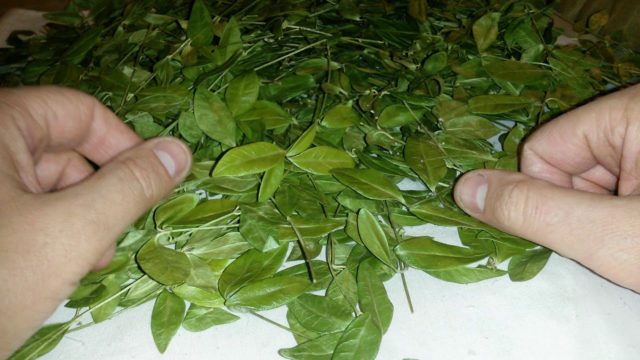
Mainly the leaves of the plant are harvested
Contraindications
Small periwinkle is not recommended for use without first consulting a doctor. Its overdose can lead to problems in the functioning of the cardiovascular system, up to and including cardiac arrest.
Also contraindications to the use of a plant of this variety are:
- bradycardia;
- pregnancy;
- breastfeeding period;
- children (up to 12 years old) and old age;
- pathology of the heart.
An incorrectly selected dosage will negatively affect the functioning of the kidneys, liver and nervous system.
Conclusion
A photo and description of the lesser periwinkle can be found in any botanical reference book. The inconspicuous plant, which is often used in the form of a green covering, is of great benefit, since its correct use can cope with small wounds and alleviate the course of serious diseases such as leukemia.
Testimonials
Gardeners appreciate the small periwinkle for its unpretentiousness. Its varieties and types allow you to recreate any fantasy and idea on the territory of the garden.
